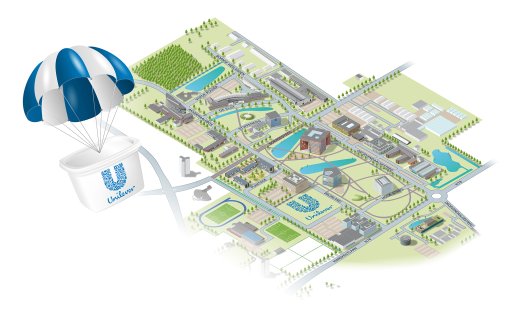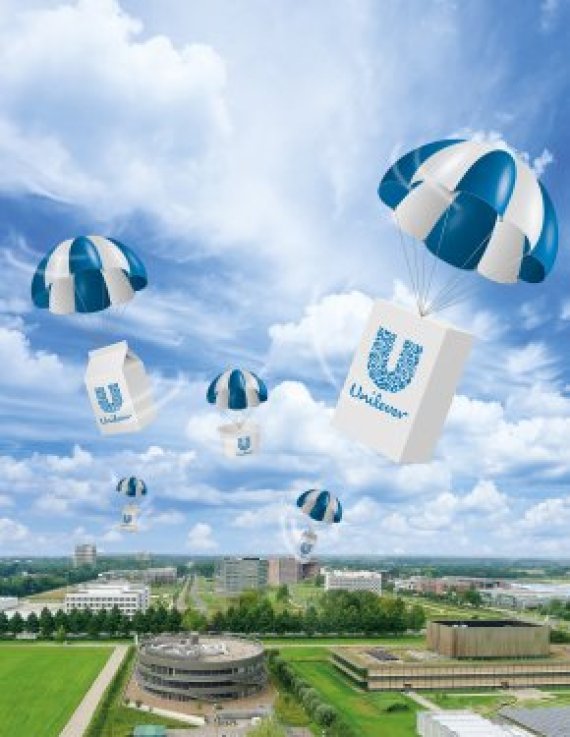Illustration: Geert-Jan Bruins
1. What does the arrival of Unilever mean to WUR?
An influential multinational moving in next-door. What does that mean for Wageningen University & Research? Professor Remko Boom, who knows Unilever inside out, sees more pros than cons.
Remko Boom is familiar with Unilever. He worked at the company’s R&D lab in Vlaardingen for six years and has worked a lot with Unilever since he became professor of Food technology at WUR in 1998. Particularly within the Institute for Sustainable Process Technology (ISPT), a consortium of universities and companies seeking to improve their processing and make it more sustainable.
‘Unilever has big ambitions when it comes to sustainability,’ says Boom. ‘The company is in Wetsus too, the water institute that does research on water-saving measures and waste water from cleaning processes. The company is investing in projects aimed at saving water throughout the chain.’ Unilever is a major research partner in the Netherlands, says Boom. ‘And if as WUR we have a mission to make better use of resources, it is logical to collaborate with other parties that want to do that too, such as Unilever.’
 Remko Boom (photo: Kosterman)
Remko Boom (photo: Kosterman)
For Boom, Unilever is a nice research partner to work with. ‘The researchers there have all got PhDs, they know a lot and you learn a lot from them. In some research fields they are ahead of us.’ Unilever’s R&D centre is big and has the capacity to do fundamental research too. ‘When I worked for Unilever, I was working on mathematical models. That research did not lead to any direct applications. And I never had the idea that the management wanted to influence the results of the research. They always looked for criticism, including from universities. Which is appropriate for a market leader that produces consumer products. You don’t want your claims to prove shaky.’ Unilever does not publish all its research results, adds Boom. ‘Things which are crucial to the company, it keeps to itself. But it is not a secretive company.’
According to Boom, Unilever coming to Wageningen is going to mean more collaboration between WUR and the company over the using of research infrastructure. ‘I hope they will share expensive equipment, for example at the Centre for Advanced Technology AgroFood. That sort of collaboration will then make WUR stronger too. I also think more joint projects will be set up, because strong researchers will talk to each other more. And thirdly, this is good publicity for Food Valley of course. It wouldn’t surprise me if other research institutes will want to set up shop in Wageningen now too.’
But won’t this close collaboration combined with the geographical proximity of a company compromise WUR’s independence? Not necessarily, says Boom. ‘I don’t see the companies as a customer, because the customer is always right. I see them as partners you can work with if you like. If I have to choose between a company and a PhD researcher or a student, I’ll choose the PhD researcher or student. I always tell a company that before we start a study. If the company wants us to switch to a new topic, for instance, while the PhD researcher wants to go deeper into the topic we’re on at the moment, I’ll go with the PhD researcher’s wishes.’
2. What’s in it for Unilever?
Unilever hopes the branch in Wageningen will give innovation a boost. FrieslandCampina has had its Innovation Centre on the Wageningen campus for three years now. Has that proved beneficial? Certainly, says Ger Willems, research director at the company.
 Ger Willems (photo: Guy Ackermans)
Ger Willems (photo: Guy Ackermans)
Willems does not have to think hard to come up with the benefits of coming to the Wageningen campus. ‘The biggest advantage for us it that it makes collaboration so easy.’ Formerly, when he worked from FrieslandCampina’s R&D lab in Deventer, Willems had to make appointments to go to Wageningen. Nowadays he calls research leaders at WUR to ask if they have time for a cup of coffee. After all, they are walking distance apart. ‘The intensity of the cooperation has increased a lot.’ The dairy company has been on the Wageningen campus since 2013. The number of joint projects with WUR has not increased significantly in these years, says Willems. ‘We already knew which Wageningen groups were relevant to us before we moved here. We were already working with them. But now it’s much easier for our researchers and those at WUR to pop in to see each other. The quality of the collaboration has improved a lot.’
A second benefit is what Willems calls ‘bycatch’. ‘You are chatting to someone at WUR and you hear something. When I was at the open day at Food & Biobased Research, for instance, I heard they had developed a machine for measuring the ripeness of fruit. Then I wondered whether you could also use it to measure the ripeness of cheese. That turned out to be too difficult, but you only make a connection like that if you happen to come across it.’
Another bit of bycatch looks likely to lead to a follow-up project. At a business drinks party Willems came across a company on the campus with a 3D printer. ‘That was a nice coincidence because just at that time we wanted to do something with 3D printers related to packaging.’

Bycatch can produce innovations and it can save money too. The most recent example, says Willems, was when researchers at FrieslandCampina wanted to buy ansome expensive analysing equipment. Before making the purchase they called in on researchers at WUR. They had a different machine which only cost a quarter of the one FrieslandCampina had in mind, and with which they could do the same research. ‘That’s the sort of nice coincidence you only get if you visit each other.’
FrieslandCampina also shares facilities with WUR in the Centre for Advanced Technology AgroFood, and makes use of the library and postal services at WUR. In turn, the university’s Dairy practicals are conducted in FrieslandCampina’s innovation centre, where about 30 WUR students spend three weeks making butter, cheese and yoghurt. ‘We have the right facilities for that. At first people thought: “A nuisance, extra work, having students around.” After the first time it was: “It’s nice, training young people – rewarding work.”’
Willems believes in the informal collaboration between companies and the university. ‘You have to get to know each other and learn to trust each other. For that you need to meet up regularly so that you know what to expect of each other. You can sew up research collaboration in contracts, but they are often based on mistrust and that doesn’t work.’
Willems is aware of the critical noises made by people who think the business world dictates the research agenda too much, because often nowadays researchers need a signature from companies in order to get funding for a proposal. Willems: ‘We try to provide clarity by indicating what our research agenda is. Then WUR researchers know: there’s no point going along to FrieslandCampina with this topic.’
3. Does the presence of companies here affect independence?
The imminent arrival of Unilever in Wageningen UR has revived the discussion about commercial interference in research again. This interference is indeed going too far, claim three Wageningen professors, but that has nothing to do with geographical proximity. It is due to a glitch in research funding by NWO.
 Marcel Zwietering (photo: Guy Ackermans)
Marcel Zwietering (photo: Guy Ackermans)
Professor of Food microbiology Marcel Zwietering likes working with food producers such as Unilever, preferably in a consortium. ‘As a food microbiologist, I have to collaborate with the food industry. If I don’t do that, I’m not doing my work properly. But for the sake of balance it’s good for me to work with societal organizations addressing food safety too.’
That balance has been lost now, says Zwietering. ‘Most of the research proposals nowadays have to be submitted via companies.’ The goes not only for research financiers focusing specifically on public-private collaboration but also for the major research financier NWO. ‘It has gone too far. the industry now has too much of a say in the research agenda.’
 Sacco de Vries (photo: Guy Ackermans)
Sacco de Vries (photo: Guy Ackermans)
Sacco de Vries, professor of Biochemistry, agrees. He gives an example. ‘The NWO programme Building blocks of Life asks companies for 10 percent cofinancing. A project worth half a million euros has just been acquired for this fundamental research programme. So then you have to generate 50,000 euros from companies for fundamental research. Often that’s not feasible. Companies get approached by so many researchers that they don’t have any more funding available.’ These days, companies are even asked for cofunding for EU networks training PhD researchers, says De Vries. ‘The funding system for research with uncertain results is completely out of kilter at the moment.’
According to Sander Kersten, professor of Nutrition, metabolism and genomics, the influence of companies extends to Wageningen PhD research as well. ‘I think 20 to 30 percent of my PhD candidates are working on public-private projects. These are financed by NWO and one or more companies, for example, but it that case it is ultimately the company which sets the research agenda.’
Kersten does not blame the companies for this. ‘But I do question whether this is a sensible system from the Dutch government’s point of view. They now leave research decision-making entirely up to the business world. This means less fundamental research and more research focused on the short term.’
 Sander Kersten (photo: Guy Ackermans)
Sander Kersten (photo: Guy Ackermans)
Kersten raised this problem recently in the Dutch newspaper Het Parool. In public-private research projects in the top sectors, funded by the NWO, he explains in the article, cofinancing by companies is compulsory. So the companies negotiate the setup of the research with the researchers. But at the end of the day, when all the research proposals for the top sector have been worked out, the company can suddenly withdraw because it thinks another study is more important. There is more and more of this kind of dropping out, says Kersten. ‘You are at the mercy of the company. Previously you sometimes had your project rejected by the NWO, but then you knew there were other strong groups who must have submitted a better proposal. You don’t know that anymore now, though.’
According to Kersten, research groups face a dilemma now. ‘We need to ask ourselves whether this is what we want. At the moment we often submit proposals in all sorts of places and these are the kinds of problems we run up against. We could be concentrating on academic quality and depth instead.’ But in the current funding system that would mean accepting that your research group will shrink.
What do we already do with Unilever?
Unilever has been collaborating for years with the Wageningen nutrition and food research groups, especially in the Top institute Food and Nutrition (TIFN) and the Institute for Sustainable Process Technology (ISPT), broad consortia of universities and companies for pre-competitive research. The company also works with Wageningen water technologists in Wetsus, the European centre for sustainable water technology in Leeuwarden. And Unilever finances three endowed chairs at WUR: those of Rob Hamer (Food chemistry), John van Duijnhoven (Biophysics) and Simeon Stoyanov (Surface science). These professors all work on fundamental research questions. They decline to comment on Unilever’s plans in Wageningen.

